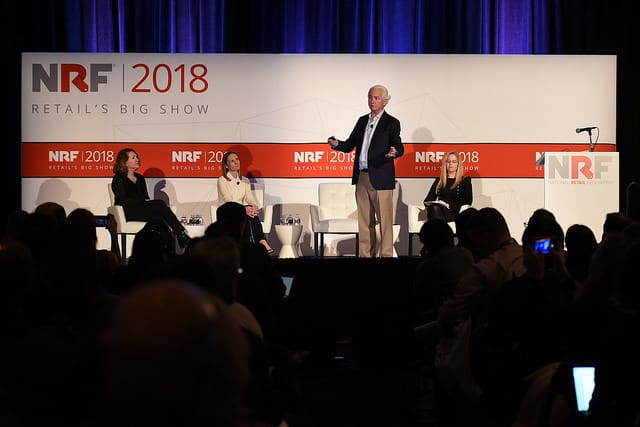The knowledge and information that is shared when 35,000 retail professionals gather for the NRF’s Big Show has been described as a fire hose of lessons and learning.
Actually, it’s more like a sprinkler — or many sprinklers, constantly distributing valuable drops of information, sometimes simultaneously. Of course, no one can be everywhere at once. So, I’ve decided to break out a few of the key messages I heard in three days at the Jacob K. Javits Convention Center with some of the best minds in retail.
Scott Emmons, head of the Neiman Marcus innovation lab, talked to me about how in 2018, shopping is shopping. Sure, there is online shopping and in-store shopping and browsing online before buying in store and strolling store aisles before buying online, but consumers don’t make distinctions.
They’ve come all the way around. They see shopping as all one, seamless (there’s that word again) experience (and that word). Or at least they expect to see it as one, seamless experience.
Retailers need to build that experience and much of the talk at the annual NRF trade show was about how technology — and particularly artificial intelligence — can help them do that.
“The technologies around AI have matured very quickly,” Joe Jensen, vice president of Intel’s retail solutions division, told a Sunday morning audience at the show. The advances, he said during a session on robotics and AI, allow retailers to turn data into actions that can increase the likelihood of success.
“We think the time is right now,” he continued. “And we really believe that data is the key to the future of retailing.”
Technology is changing retail in stores and online
The panelists talked about how technology is allowing retailers to analyze traffic patterns of shoppers and associates in stores, which is key to allowing shoppers to grab what they want and go, without having to pause at a physical checkout counter.
“We want to completely automate the retail transaction and make it frictionless,” said Bernd Schoner, CEO of DeepMagic.
For her part, Michelle Bacharach, CEO of FindMe, said her company is using natural language processing to pull together complete outfits from diverse apparel products in a catalog. Shoppers appreciate the guidance and retailers sell more when a machine can suggest a pair of shoes, a scarf and purse to go with a particular dress.
And yet, Bacharach had a word of caution, the same warning, in fact, that could be heard repeatedly amid the noise of NRF, if you listened carefully.
“My kind of big message,” Bacharach said, “is don’t think of AI as an end in itself. It’s not. It’s a means to solve problems. Start with the problem first. If there is an easier way to do it, forget AI.”
And as exciting as the prospect of robots and smart machines saving retail is, there are obstacles.
Pano Anthos, managing director of XRC Labs, who moderated the panel, said many retailers are so focused on profit that innovation suffers.
“I think fundamentally retailers are under so much pressure on their P&L, hitting their numbers every quarter for the street, it has driven down their investment in technology tremendously and it’s put them in kind of a quandary,” he said. “We’re very worried, frankly.”
Perhaps for the same reason, some retailers seem hesitant to experiment. Everybody says they want to experiment, Bacharach said, but experimentation isn’t often rewarded in terms of bonuses, for instance.
Anthos sees a divide forming between legacy retailers and “digital natives,” who are launching retail operations that think digital first, but are moving into physical retail.
“They design their operations around the data the way an online store would,” he said. “I think retailers are going to have to step back and look at the mix of spending. They’re going to have to allocate more resources toward technology.”
The digital natives also prepare themselves to fail — and learn, Anthos said.
“So culture is a big issue here,” he said. “If you have a culture internally that doesn’t support failure as a learning experience, then you’re not really testing, meaning you’re not going to grow.”
Retailers need to be relentless in their experimentation, Intel’s Jensen added.

Retail leaders from 1-800-Flowers.com, eBay and Cosabella talk about the role of AI in retail.
“The rate and pace of innovation is staggering,” he said. “And if you tried something one year, two years ago, it’s a completely different ball game today. This world is changing so fast, you’ve got to keep pushing and changing.”
Embracing cutting-edge technology is a key to ecommerce success
The benefits of trying new things, whether you’re successful or not, was on full display during a different discussion the following day.
Chris McCann, CEO of 1-800-Flowers.com went old school as he explained that years ago his company was propelled forward dramatically by embracing the cutting edge technology of the day — 1-800 phone ordering. It sounds ancient, but it was ground-breaking a the time and it was the start of a philosophy of constantly jumping on the next, new thing.
“New technology is constantly emerging,” he said. “It always has the potential to change consumer behavior. It always has the potential to disrupt our business.”
McCann said he believes in learning new technologies as consumers are learning them. That way retailers don’t have to worry about catching up with consumers. They are already there. He suggests adopting as many new technologies as possible. They won’t all pan out, but when one innovation does pan out, progressive retailers will be front-runners in using it and offering it to consumers.
Silvia Campello, president and COO of Cosabella, advised retailers to look for technology vendors who were constantly learning and improving. She described something much more akin to a partnership than to a customer/vendor relationship.
“Vendors need you as much as you need them,” she said to the merchants gathered for a session called, “How AI is currently powering retail’s growth.” “I think one of the main things is finding someone who is maybe looking to expand their case study program, so their AI can learn from your data. They have as much to learn as you do.”
Beyond the specific suggestions at NRF was a pervasive theme that retailers need to be nimble and act fast.
“The customer, end-to-end, your journey in commerce is going to change,” said Kris Miller, eBay’s chief strategy officer and a panelist. “How they become aware of brands; how they browse for inspiration and discovery; how they make decisions at what price; how post transaction support works; how you ship.”
In short, McCann said, retailers need to “get speeding tickets, not parking tickets.”
“I don’t think we’re moving fast enough,” McCann explained. “I think the consumer is moving so fast that we don’t want to play catch up.”
Photo of crowd by Mike Cassidy. Photo of panel courtesy of NRF.
Contact Mike Cassidy at [email protected]; follow him on Twitter at @mikecassidy.








